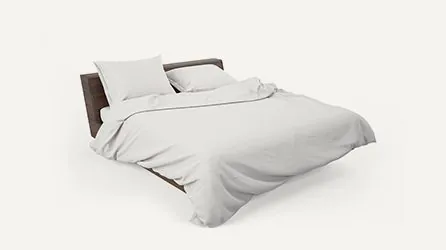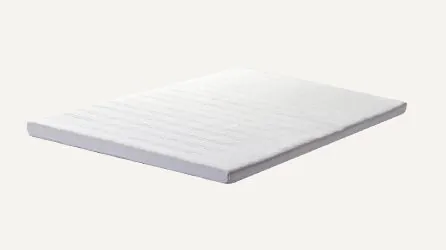Mattress Article
Sleep problems can be solved by changing to a suitable mattress.
Quality sleep is essential for our health, but many people still experience sleep problems that affect their daily lives. Whether it’s insomnia, frequent waking during the night, or waking up feeling tired, these issues can stem from various factors. One often overlooked cause is an unsuitable mattress. Switching to a new mattress that fits your body and adjusting your sleep habits could be key to improving your sleep quality.
Common sleep problems caused by an unsuitable mattress.
● Back and neck pain upon waking up

One clear warning sign of sleep problems is waking up with back pain, neck pain, or muscle soreness in various parts of the body. A mattress that is too firm or too soft cannot properly support the spine in its natural position, causing pressure on different points of the body. This leads to pain and poor-quality sleep.
For example, people who like to sleep on their side may experience shoulder and hip pain from a mattress that is too firm, while those who prefer sleeping on their back might have issues with excessive spinal curvature from a mattress that is too soft. Choosing a new mattress with medium firmness that can adapt to the shape of the body while sleeping can effectively reduce these problems.
● Insomnia and frequent nighttime awakenings

Insomnia and frequent nite awakenings can be caused by mattress discomfort. When the body isn’t properly supported, it leads to frequent changes in sleep position to find a comfortable spot. This results in interrupted sleep and the nervous system not being able to fully enter deep sleep stages.
Some people may feel hot or sweaty because their mattress doesn’t breathe well, or too cold from a mattress that over-ventilates. Choosing a new mattress with ventilation technology suitable for each individual’s body condition can help improve these sleep problems.
● Feeling tired even after getting a full night’s sleep.

Waking up feeling tired even after a long night’s sleep is another sign of sleep problems caused by an unsuitable mattress. When the body doesn’t get full rest during sleep, its repair and recovery systems don’t function at their best, leading to feelings of fatigue and a lack of freshness in the morning.
How to Choose a New Mattress to Solve Sleep Problems
● Assess sleep posture and body needs.
Understanding your preferred sleeping position is a crucial first step in choosing a new mattress. Side sleepers need a mattress soft enough to provide good support for their shoulders and hips, but also firm enough to keep their spine aligned. Back sleepers should choose a medium-firm mattress to support the natural curve of their lower back, while stomach sleepers need a firmer mattress to prevent their hips from sinking too far into the mattress.
Assessing body weight and height is also important. People who are overweight may need a firmer mattress for better support, while those who are lighter may find a softer mattress more comfortable. Understanding these needs will effectively reduce sleep problems.
● Understand the materials and technology of mattresses.
Today’s mattresses come in various types of materials, each with its own advantages and disadvantages. Memory foam mattresses help distribute weight, reduce pressure points, and conform to the body’s natural sleeping position, making them suitable for people with sleep problems caused by joint and muscle pain. Spring mattresses often provide good support and excellent ventilation, making them ideal for those who tend to feel hot while sleeping.
Natural latex mattresses are flexible and durable, and they resist the growth of bacteria and dust mites. Hybrid mattresses, which combine multiple technologies and materials, offer comprehensive benefits for improving sleep quality. Understanding the properties of each material will help you choose a new mattress that accurately meets your needs.
Signs that it’s time to replace your mattress
● The lifespan and condition of the mattress.<
Mattresses that are over 7-8 years old often begin to lose their ability to support the body. Even if they don’t appear damaged from the outside, the internal structure may have deteriorated, leading to sleep problems. Signs that indicate a need for a new mattress include deep indentations where you regularly sleep, noise when you move or turn over, or your partner starting to feel your movements more than before.
Regularly checking the condition of your mattress will help you notice any changes and decide to replace it in a timely manner, before sleep problems become long-term health issues.
● Changes in body and lifestyle
The body’s need for sleep can change with age, weight, or health conditions. Those experiencing joint or bone problems may need a mattress that provides more support than before, or someone who changes their sleeping habits from sleeping alone to sleeping with a partner may need a new mattress with the size and features suitable for both users.
Listening to your body’s signals and adjusting your sleep quality to meet your current needs will effectively prevent insomnia and other related health problems.
Tips for Adjusting to a New Mattress
Adjustment and preparation period
When switching to a new mattress, the body needs about 2-4 weeks to adjust. Initially, it might feel unfamiliar or strange, but this is normal. Allowing the body enough time to adjust will help resolve any existing sleep problems. Therefore, mental preparation and patience during this transition are important.
Additionally, creating a suitable sleep environment also contributes to improving sleep quality. Using pillows appropriate for the new mattress, adjusting room temperature, and creating a sleep-friendly atmosphere will help the transition go smoothly.
The sleep problems many people experience aren’t always caused by complex factors. Sometimes, simply changing to a new mattress that suits the body and its needs can significantly improve sleep quality. Understanding the issues, choosing the right mattress, and allowing the body time to adjust are important steps in addressing insomnia and related problems.
Investing in a new quality mattress is an investment in long-term health because quality sleep has a positive impact on the immune system, brain function, and the body’s ability to recover.
If you’re experiencing sleep problems, start by assessing your current mattress and consider replacing it with a new one that suits your needs. To restore good sleep quality and healthy living, let Bedisupreme be another option to help you sleep even better with the right quality mattress, available in a variety of options to suit your needs at Bedisupreme









